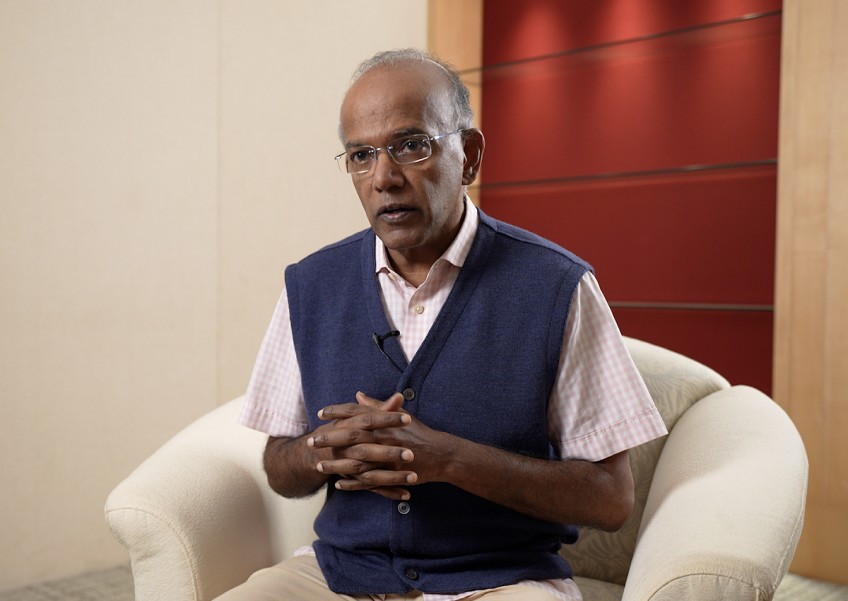風蕭蕭_Frank
以文會友新加坡內閣部長怒懟英媒《經濟學人》:你的嘲笑值幾個錢?
熊超然 2024-04-21 來源:觀察者網
【文/觀察者網 熊超然】隨著新加坡總理李顯龍即將在5月15日“交棒”副總理兼財政部長黃循財,新加坡政治即將進入新一階段。
當地時間4月18日,英國《經濟學人》周刊發表了一篇評論文章,討論新加坡的“政治交接”,其中語氣不乏嘲笑輕視之意,不僅稱黃循財是“陌生麵孔”、“非首選接班人”,還對新加坡人民行動黨議論紛紛。
4月19日,新加坡內政部長兼律政部長尚穆根在其個人臉書賬號發文,從國家治理、經濟等諸多方麵舉例,對比新加坡和英國的兩國情況,以反駁《經濟學人》。他指出,相比於新加坡政局穩定,英國不僅政局混亂,且政客以權謀私;新加坡過去被英國殖民時人均GDP僅有500美元,如今不但超8萬美元,還遠遠領先於英國。
除此之外,新加坡在社會治理的方方麵麵都優於英國,為此,尚穆根“靈魂拷問”《經濟學人》:“你的嘲笑值幾個錢?”

尚穆根臉書截圖 Lawrence wong will be only fourth PM
《經濟學人》的這篇文章稱,新加坡59年以來“隻出現”三位領導人,但即將接任總理的黃循財對許多新加坡人來說依舊是“陌生麵孔”。文章還稱,黃循財其實並非新加坡“第四代團隊領導人”的首選,隻因另一位副總理王瑞傑2021年“基於年齡和健康的考量”突然退出“總理之爭”。
此外,文章還稱,未來的大選將是對黃循財的重大考驗,盡管如此,人民行動黨仍將獲勝,《經濟學人》將此歸因於人民行動黨強大的政黨組織、對反對黨的“無情打壓”,以及新加坡當地媒體“太過溫順”所致。
針對這一篇評論文章,新加坡內政部長兼律政部長尚穆根在社交媒體臉書發文反擊稱,《經濟學人》對新加坡“語帶嘲笑”,這是根植於英國“評論階級”潛意識深處的一種本能,他們無法忍受曾經殖民過的國家如今表現得更好。
尚穆根表示,從治理角度而言,黃循財將是新加坡59年來的第四任總理,而蘇納克則是英國4.9年以來的第四任首相。與此同時,英國前首相約翰遜在任職期間,接受了捐贈者提供的價值1.5萬英鎊的旅行費用,以及5萬英鎊的住宅裝修費用,“在新加坡,任何像約翰遜這樣做的人都會受到法庭指控”。
尚穆根表示,從經濟角度而言,新加坡最初是英國的殖民地,人均GDP隻有500美元,現在已增長到超過8萬美元。《福布斯》雜誌最近的一份報告則顯示,若按購買力平價計算,新加坡的人均GDP在全球排名第五,遠遠領先於英國。
談到新加坡媒體被形容為“溫順”,尚穆根寫道:“它(《經濟學人》)顯然更喜歡像英國這樣的情況,一個人可以控製主要媒體,讓政客們向其獻殷勤,媒體所有者可以影響誰當選、誰成為首相。在出現類似情況的澳大利亞,一位前總理將此情況形容為‘民主的毒瘤’。”

資料圖:新加坡內政部長兼律政部長尚穆根
緊接著這些,尚穆根又在社會服務、公共安全、法律秩序、社會凝聚力、種族階級等多個方麵論證新加坡優於英國。
比如他提到,去年,整個英格蘭和威爾士地區,在對超33萬起車輛犯罪(包括盜竊和入室盜竊)的調查結案中(占所有報案量的85%),沒有任何嫌疑人被逮捕;在100多個社區中,沒有汽車盜竊案被破獲。這種情況在新加坡簡直“不可想象和不可接受”,自2015年以來,新加坡一直被調查機構蓋洛普評為“全球最安全國家”,95%的新加坡成年人認為夜間獨自行走是安全的。
最後,尚穆根反問了《經濟學人》一句話:“你的嘲笑值幾個錢?(What price your sneer?)”
據新加坡《聯合早報》此前報道,新加坡總理公署4月15日下午發文告,宣布新加坡總理李顯龍將在5月15日正式卸下總理職務。
《聯合早報》按照新加坡首兩任總理李光耀和吳作棟當年移交職權的時間表推算,李顯龍很可能在5月13日,即15日交棒的兩天前,向新加坡總統尚達曼遞交辭呈,連同整個政府班底一起辭職,並向總統提議由新加坡副總理兼財政部長黃循財接任總理,組建政府。
新加坡總統接受原總理的辭呈後,將委任黃循財為新總理,而新總理也會把新的內閣名單提呈給總統。黃循財將在15日晚上8時在新加坡總統府宣誓就職該國第四任總理。黃循財此前在2022年4月獲推舉為第四代團隊的領袖。
《聯合早報》報道稱,今年8月的新加坡國慶群眾大會,將由新總理向該國全國人民發表演說。新加坡總理公署文告還顯示,新加坡人民行動黨議員一致支持現年51歲的黃循財接下領導國家的棒子。
<<<<<<<<>>>>>>>>>
“你的冷笑要付出什麽代價”:尚穆根回擊《經濟學人》對新加坡領導層換屆的評論
https://www.asiaone.com/singapore/what-price-your-sneer-shanmugam-hits-backs-economist-commentary-singapores-leadership
“你的冷笑要付出什麽代價”:尚穆根回擊《經濟學人》對新加坡領導層換屆的評論
2024 年 4 月 20 日 作者:CHING SHI JIE
“《經濟學人》無法抗拒嘲笑,”法律和內政部長尚穆根在談到英國出版物有關新加坡領導層過渡的評論文章時說道。
周四(4月18日)發表的這篇740字的文章稱,黃循財將隻是新加坡曆史上第四位總理,他“在新加坡人中仍然相對不為人所知”。
“他不是 4G 的第一選擇,”《經濟學人》補充道,同時形容黃是一個“彈著吉他、自認是書呆子”的人,比“大多數執政精英”更容易與新加坡人產生共鳴。
文章還聲稱,執政的人民行動黨將因其“對反對派的不懈攻擊”等原因而贏得即將舉行的大選。
作為回應,尚穆根周五在臉書上發帖表示,這家英國出版物“無法忍受他們習慣於講課的人現在做得比他們更好”。
“這是英國評論界潛意識深處的一種本能,”部長補充道。
尚穆根表示,黃副總理將接替李顯龍擔任總理,成為新加坡 59 年來的第四任總理,而英國的裏希·蘇納克 (Rishi Sunak) 則是 4.9 年來的第四任總理。
蘇納克接替了利茲·特拉斯,後者是英國曆史上最短的首相——在任僅 49 天。
在經濟方麵,尚穆根表示,新加坡的人均國內生產總值超過109,000美元,位居世界第五。
“遠遠領先於英國,”他補充道。
尚穆根表示,新加坡還為人民提供“更好的醫療保健、住房和教育”,無論階級和種族如何,以及公共安全和社會凝聚力。
他舉例說,在英格蘭和威爾士,85% 的犯罪案件都已結案,沒有任何嫌疑人被抓獲,而在 100 多個社區,“所報告的汽車盜竊案件的破案率為零”。
“這樣的情況在新加坡是不可想象和不可接受的,”他說。
尚穆根還指出英國一位政治捐助者如何發表種族主義言論,他的政黨表示“一切都應該繼續前進”。
“在新加坡,發表此類言論的人可能會受到法庭指控,”他說。 “你的冷笑要付出什麽代價。”
'What price your sneer': Shanmugam hits back at Economist commentary on Singapore's leadership transition

"The Economist can't resist sneering," said Law and Home Affairs Minister K Shanmugam of the British publication's commentary piece on Singapore's leadership transition.
The 740-word article, published on Thursday (April 18), said that Lawrence Wong will only be the fourth prime minister in Singapore's history and he "remains relatively unknown among Singaporeans".
"He was not the 4G's first choice," The Economist added while describing Wong as a "guitar-strumming, self confessed nerd" who is more relatable to Singaporeans than "most of the governing elites".
The article also claimed that the ruling People's Action Party will win the upcoming General Election due to its "unrelenting attacks on the opposition" among other reasons.
In response, Shanmugam said in a Facebook post on Friday that the British publication "can't stand that people they were accustomed to lecturing are now doing better than they are".
"It's an instinct lodged deep in the unconscious of the British commentariat class," the minister added.
While Deputy Prime Minister Wong will take over as prime minister from Lee Hsien Loong as Singapore's fourth prime minister in 59 years, Britain's Rishi Sunak is the fourth PM in 4.9 years, Shanmugam said.
Sunak had succeeded Liz Truss, who was the shortest prime minister in Britain's history - just 49 days in office.
On the economy, Shanmugam said that Singapore's per capita gross domestic product at over $109,000 is the fifth highest in the world.
"Well ahead of the UK," he added.
Shanmugam said that Singapore also provides "far better healthcare, housing and education" to its people, regardless of classes and races, as well as public safety and social cohesion.
He cited how 85 per cent of all crime cases reported in England and Wales were closed without any suspect caught, and "0 per cent of reported car thefts are solved" in more than a hundred neighbourhoods.
"A situation like that would be unthinkable and unacceptable in Singapore," he said.
Shanmugam also pointed out how a political donor in Britain made racist remarks, and his party said that "all should just move on".
"In Singapore, a person who makes such a comment is likely to be charged in court," he said. "What price your sneer."
ALSO READ: Lawrence Wong set to become PM in May: Will General Election be held this year?
<<<<<<<<>>>>>>>>>
'What price your sneer': Shanmugam hits back at Economist commentary on Singapore's leadership transition

 APRIL 20, 2024 By CHING SHI JIE
APRIL 20, 2024 By CHING SHI JIE"The Economist can't resist sneering," said Law and Home Affairs Minister K Shanmugam of the British publication's commentary piece on Singapore's leadership transition.
The 740-word article, published on Thursday (April 18), said that Lawrence Wong will only be the fourth prime minister in Singapore's history and he "remains relatively unknown among Singaporeans".
"He was not the 4G's first choice," The Economist added while describing Wong as a "guitar-strumming, self confessed nerd" who is more relatable to Singaporeans than "most of the governing elites".
The article also claimed that the ruling People's Action Party will win the upcoming General Election due to its "unrelenting attacks on the opposition" among other reasons.
In response, Shanmugam said in a Facebook post on Friday that the British publication "can't stand that people they were accustomed to lecturing are now doing better than they are".
"It's an instinct lodged deep in the unconscious of the British commentariat class," the minister added.
While Deputy Prime Minister Wong will take over as prime minister from Lee Hsien Loong as Singapore's fourth prime minister in 59 years, Britain's Rishi Sunak is the fourth PM in 4.9 years, Shanmugam said.
Sunak had succeeded Liz Truss, who was the shortest prime minister in Britain's history - just 49 days in office.
On the economy, Shanmugam said that Singapore's per capita gross domestic product at over $109,000 is the fifth highest in the world.
"Well ahead of the UK," he added.
Shanmugam said that Singapore also provides "far better healthcare, housing and education" to its people, regardless of classes and races, as well as public safety and social cohesion.
He cited how 85 per cent of all crime cases reported in England and Wales were closed without any suspect caught, and "0 per cent of reported car thefts are solved" in more than a hundred neighbourhoods.
"A situation like that would be unthinkable and unacceptable in Singapore," he said.
Shanmugam also pointed out how a political donor in Britain made racist remarks, and his party said that "all should just move on".
"In Singapore, a person who makes such a comment is likely to be charged in court," he said. "What price your sneer."
ALSO READ: Lawrence Wong set to become PM in May: Will General Election be held this year?
<<<<<<<<>>>>>>>>>
黃循財將成為新加坡曆史上第四任總理
下一任領導人承諾延續和變革
2024 年 4 月 18 日
在共和國59年的曆史中,新加坡隻有三位領導人。 5月15日是第四次,屆時擔任總理20 年的李顯龍(現年72歲,其父親李光耀以鋼鐵般的意誌統治了31年)將辭職。在總統府舉行的儀式上,現任財政部長黃循財將宣誓就職。他比李先生小二十歲。新加坡現在麵臨著沒有李光耀掌舵的未來前景。
此次任命也標誌著執政黨人民行動黨將接力棒從黨的“3g”(第三代)高級幹部手中移交給選擇黃先生為人選的“4g”群體。黃先生隨後可能會在今年的某個時候舉行大選。爸爸已經確保永遠不會失去一個,黃先生當然也不會失去他的。 他獲得多數席位的保證讓許多其他國家的領導人哭泣。但永遠不要認為選舉對教皇來說不重要。所麵臨的風險比表麵上看到的還要大。
新加坡人不再僅僅根據其傳統的重點來評判人民政府,即實現經濟增長,並確保新加坡這個多民族的繁榮小國在麻煩的海洋中免受威脅,使其非凡的成功和社會凝聚力免受威脅。
事實上,許多年輕的新加坡人不太尊重等級製度,希望在增長分享方麵更加公平:他們認為一個擁有如此龐大財政儲備的國家應該更慷慨地支持福利。他們還希望政治更具參與性,而不是來自高層的嚴格指導。當黃先生前往該國時,他麵臨的危險不是他(和 4g)的正式授權,而是道德合法性。
該黨不喜歡留下任何機會,在變革之前先要有連續性。 黃先生淡化了大選前重大內閣改組的預期。在此之後,李先生將像他的父親一樣繼續留任,擔任高級部長(通常稱為 sm——該黨喜歡縮寫)。至少一位保守派的關鍵成員尚穆根 (K. Shanmugam) 將留任。自2008年以來,他一直擔任法律部長並管理內政部。
尚穆根先生對新加坡麵臨的威脅持悲觀態度。其中包括從以穆斯林為主的馬來西亞和印度尼西亞蔓延的極端主義;外國的虛假信息活動;新加坡的開放經濟尤其容易受到大國競爭和其他貿易扭曲力量的影響。警惕是口號。教皇還喜歡警告其他地方民粹主義政治的危險。它把自己表現為防止揮霍的衛士。
然而黃先生承諾與過去決裂。本周,他描述了一個“快速變化的環境”,需要新的方法和準備“開辟新天地”。 一些人認為他的議程將因缺乏政治資本而受阻。 他並不是4g的首選。 現任經濟部長王瑞傑是李先生指定的繼任者,直到他於 2021 年突然退出。黃先生是一位非常有能力的前技術官僚,於 2011 年進入政壇,在大流行期間是政府的公眾形象。 盡管如此,他在新加坡人中仍然相對不為人知。
事實上,成為妥協的候選人可能並不是壞事。 沒有一個 4g 成員能夠希望以早期領導人的超凡魅力來進行統治。 黃先生的領導可能會更加集體化,能夠達成共識——或許甚至包括黨外的共識。 兩年前,黃先生領導了一項名為“前進新加坡”的谘詢計劃,旨在就提高富人稅收和加強社會福利等問題征求公民的意見。 與大多數執政精英相比,性格溫和的黃先生更受新加坡人歡迎。 這位在東海岸住宅區長大、彈著吉他、自認是個書呆子的人並沒有上過任何一所精英學校,而這些學校是那些雄心勃勃的人經常用來評判自己的。 對許多人來說,這是一個優點。
黃先生以一定程度的善意開始了演講。盡管如此,選舉仍將是他的關鍵考驗。人民黨將獲勝,要歸功於強大的組織、對反對派的無情攻擊、溫順的媒體、良好的治理記錄,以及一個並不總是潛意識的信息,即它的生存和新加坡的生存是同義詞。然而,如果反對派在其目前擁有的 87個選舉席位中獲得的席位遠遠超過1個,那麽變革候選人將在起步時處於不利地位。
Lawrence Wong will be only the fourth PM in Singapore's history
The next leader promises continuity and change




